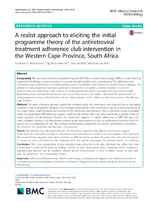| dc.contributor.author | Mukumbang, Ferdinand C. | |
| dc.contributor.author | Marchal, Bruno | |
| dc.contributor.author | Van Belle, Sara | |
| dc.contributor.author | van Wyk, Brian | |
| dc.date.accessioned | 2018-05-29T10:02:11Z | |
| dc.date.available | 2018-05-29T10:02:11Z | |
| dc.date.issued | 2018 | |
| dc.identifier.citation | Mukumbang, F.C. et al. (2018). A realist approach to eliciting the initial programme theory of the antiretroviral treatment adherence club intervention in the Western Cape Province, South Africa. BMC Medical Research Methodology, 18: 47 | en_US |
| dc.identifier.issn | 1471-2288 | |
| dc.identifier.uri | http://dx.doi.org/10.1186/s12874-018-0503-0 | |
| dc.identifier.uri | http://hdl.handle.net/10566/3743 | |
| dc.description.abstract | BACKGROUND: The successful initiation of people living with HIV/AIDS on antiretroviral therapy (ART) in South Africa has
engendered challenges of poor retention in care and suboptimal adherence to medication. The adherence club
intervention was implemented in the Metropolitan area of the Western Cape Province to address these challenges. The
adherence club programme has shown potential to relieve clinic congestion, improve retention in care and
enhance treatment adherence in the context of rapidly growing HIV patient populations being initiated on ART.
Nevertheless, how and why the adherence club intervention works is not clearly understood. We aimed to elicit an
initial programme theory as the first phase of the realist evaluation of the adherence club intervention in the Western
Cape Province.
METHODS: The realist evaluation approach guided the elicitation study. First, information was obtained from an exploratory
qualitative study of programme designers’ and managers’ assumptions of the intervention. Second, a document review of
the design, rollout, implementation and outcome of the adherence clubs followed. Third, a systematic review of available
studies on group-based ART adherence support models in Sub-Saharan Africa was done, and finally, a scoping review of
social, cognitive and behavioural theories that have been applied to explain adherence to ART. We used the
realist evaluation heuristic tool (Intervention-context-actors-mechanism-outcome) to synthesise information from the
sources into a configurational map. The configurational mapping, alignment of a specific combination of attributes,
was based on the generative causality logic – retroduction.
RESULTS: We identified two alternative theories: The first theory supposes that patients become encouraged,
empowered and motivated, through the adherence club intervention to remain in care and adhere to the treatment.
The second theory suggests that stable patients on ART are being nudged through club rules and regulations
to remain in care and adhere to the treatment with the goal to decongest the primary health care facilities.
CONCLUSION: The initial programme theory describes how (dynamics) and why (theories) the adherence club
intervention is expected to work. By testing theories in “real intervention cases” using the realist evaluation
approach, the theories can be modified, refuted and/or reconstructed to elicit a refined theory of how and
why the adherence club intervention works. | en_US |
| dc.language.iso | en | en_US |
| dc.publisher | BioMed Central | en_US |
| dc.rights | © The Author(s). 2018 Open Access This article is distributed under the terms of the Creative Commons Attribution 4.0
International License (http://creativecommons.org/licenses/by/4.0/), which permits unrestricted use, distribution, and
reproduction in any medium, provided you give appropriate credit to the original author(s) and the source, provide a link to
the Creative Commons license, and indicate if changes were made. The Creative Commons Public Domain Dedication waiver
(http://creativecommons.org/publicdomain/zero/1.0/) applies to the data made available in this article, unless otherwise stated. | |
| dc.subject | Adherence | en_US |
| dc.subject | Adherence club | en_US |
| dc.subject | Antiretroviral therapy | en_US |
| dc.subject | Configurational mapping | en_US |
| dc.subject | Intervention-Context-Actormechanism- outcome configuration | en_US |
| dc.subject | GenIntervention-Context-Actormechanism- outcome configuration | en_US |
| dc.subject | Generative mechanisms | en_US |
| dc.subject | Programme theory | en_US |
| dc.title | A realist approach to eliciting the initial programme theory of the antiretroviral treatment adherence club intervention in the Western Cape Province, South Africa | en_US |
| dc.type | Article | en_US |
| dc.privacy.showsubmitter | FALSE | |
| dc.status.ispeerreviewed | TRUE | |

